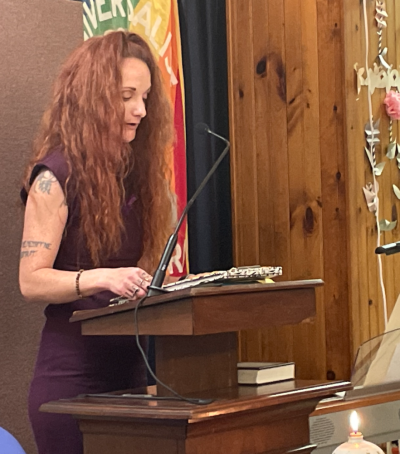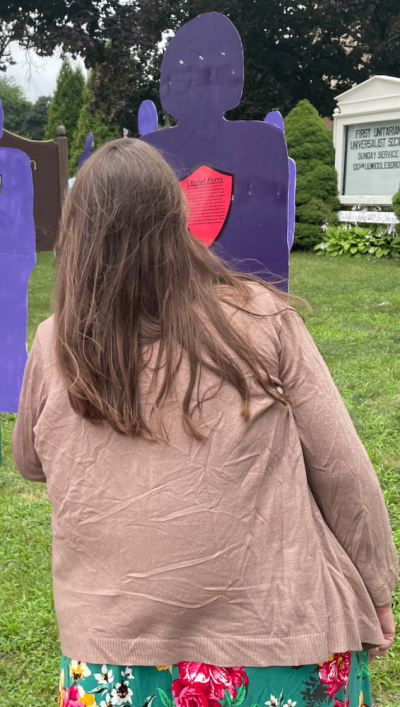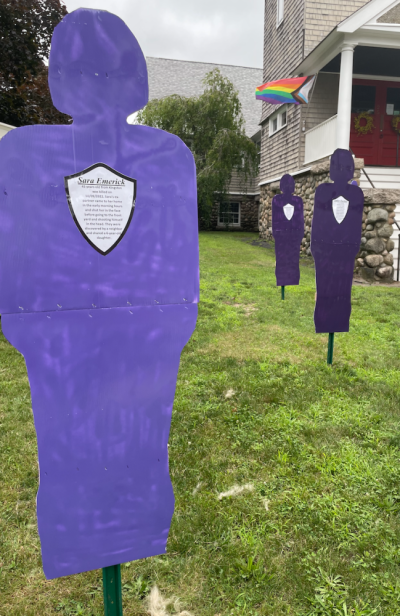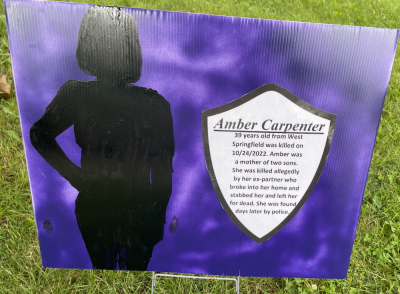Believe and support domestic violence victims, speakers say
MIDDLEBORO — Twenty-two silhouettes stand on the lawn of the First Unitarian Universalist Society of Middleboro, as silent as the women and children they represent.
Each silhouette bears the name and story of a domestic violence victim from Massachusetts who was killed in the last 18 months or so. They will be on display through July 22 on the lawn at 25 South Main St.
Sarah’s story is not told on a silhouette. But, she shared with an audience at the church Sunday morning, it easily could have been.
“I am them,’’ said Sarah, who preferred that her last name not be used. “They are me. They are mothers, sisters, daughters. Every silhouette out there is a person.’’
For years, she said, she was a domestic violence victim. Her teeth were knocked out. Her face suffered partial paralysis. She was held hostage along with her newborn baby. Doors in her home were ripped off their hinges and windows were broken.
“I should be dead,’’ she said. And a part of her was lost, she said. “He stripped me of the Sarah my family knew and loved.’’
Her abuser is now in prison, she said, but she still does not feel free. Every night, she locks her windows and barricades her doors. She does not go outside, she said, without a knife and Mace.
“What did I do to deserve that?’’ she asked rhetorically. “If you have an answer to that, you’re part of the problem.’’
Part of the solution is to listen and to believe victims, said Sandra Blatchford, executive director of South Shore Resource & Advocacy Center in Plymouth. The center provides free and confidential support, advocacy, prevention and support programs for domestic violence survivors.
“Victims don’t lie, abusers do,’’ Blatchford said. “Ask yourself, why would a victim lie? Victims don’t lie, abusers do.’’
Doubting victims gives abusers more power, something she said they crave. “Every time you question a victim….you’re telling a victim, you don’t matter.’ ’’
Thirty-four percent of Massachusetts women experience intimate partner physical violence, intimate partner sexual violence, and/or intimate partner stalking in their lifetime, according to the National Coalition Against Domestic Violence: Domestic Violence in Massachusetts.
On a typical day, according to the same source, Massachusetts local domestic violence hotlines receive 19,000 calls; that’s 13 calls per minute.
Listening to victims represents another important element, Blatchford explained.
Tell the victim, she said,: “You don’t deserve this, you never did, you never will and I am here to help.’’
She also urged the public to hold the criminal justice system _ police, judges, court clerks, the district attorney’s office _ accountable.
Advocate for victims by supporting relevant legislation, she said. She cited Massachusetts Senate Bill 1098, now making its way through the Legislature, which would make unauthorized removal or destruction of a global positioning satellite device (GPS) a felony, with a mandatory two-year prison sentence. Domestic violence offenders are at times released from confinement on the condition that they wear these devices so their movements can be tracked. By cutting them off, the wearer’s location is not known, which advocates say can make domestic violence victims especially vulnerable.
“We need to have a conversation’’ on the topic, Sarah said, referring to the overall community. “Don’t wait until this touches your life to care.’’
For more information on South Shore Resource & Advocacy Center, visit www.ssrac.org. An emergency hotline is staffed 24 hours a day and can be reached at 1-888-746-2664.














